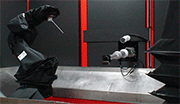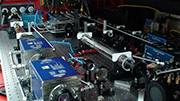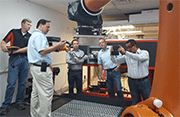E-Archive
Articles
in Vol. 18 - November Issue - Year 2017
Laser Peening Advancing Aerospace Research in Germany

Inside the ZAL TechCenter in Hamburg, Germany (Copyright ZAL-LHT)

Inside the Procudo® 200 Laser Peening Cell

Optical components of the Procudo® 200 Laser Peening System

Laser peening equipment demonstration at LSPT′s facility
Deep in the heart of Hamburg, the future of aerospace engineering is taking flight. The ZAL Center of Applied Aeronautical Research (ZAL) is home to some of the most advanced technology in civil aviation. Located within the Hamburg Aviation cluster on the banks of the Elbe river, the ZAL TechCenter brings together aerospace industry giants Airbus Operations and Lufthansa Technik, along with large and small industry suppliers, universities, research institutions, start-ups, and now a state-of-the-art Procudo® Laser Peening System.
ZAL’s goal is to provide an open innovation environment to industrialize emerging aerospace technologies. Laser peening represents the largest investment to date for research into new technologies at ZAL, and the organization is set to launch a new laser peening facility designed by American equipment provider LSP Technologies, Inc.
The ZAL collaboration model is geared toward bringing together diverse research and development partners under one roof. The TechCenter facility provides sophisticated research infrastructure supporting technical domains like Cabin Innovation, Air & Power Systems, and Aerospace Production. LSP Technologies is joining the array of innovative companies working inside the ZAL Hamburg facility, providing expertise and equipment to aerospace and other industries interested in advancing the safety and reliability of their products.
Researchers at ZAL cultivate technologies that will play a leading role in the next generation of aircraft. The facility boasts laboratories devoted to fuel cell technology, vibro-acoustic engineering and additive manufacturing, along with a state-of-the-art virtual reality lab.
"Our mission at ZAL is to provide our partners with the latest research and development infrastructure," explains ZAL Systems Engineer Dr. Thorsten Scharowsky. "By bringing together participants from all corners of civil aviation, we’ve cultivated an environment that accelerates emerging technologies to manufacturing readiness."
The Future of Material Enhancement
Soon, this high-tech research center will host the world’s most advanced surface enhancement process. Laser shock peening (LSP) is a powerful metal improvement method utilizing laser pulses to strengthen metal components. The process is currently employed to prevent fatigue cracking in fan and turbine blades, with industry adoption growing as aerospace OEMs target superior metal fatigue solutions.
"Laser peening is the single most effective method for enhancing metals," explains Dr. Jeff Dulaney, CEO of laser peening services and equipment provider LSP Technologies, Inc. (LSPT). "Aerospace manufacturers are increasingly using LSP to solve fatigue and performance issues, and we’ve only scratched the surface of laser peening applications and benefits."
Laser peening is so effective because of the powerful stress wave the process generates on a part surface. That stress wave plastically deforms robust metals like titanium and steel, imparting deep compressive residual stresses that strengthen the material and prevent cracking. "We’ve produced compressive stresses down to twelve millimeters," explains Dr. Dulaney. "We’ve extended part lifetimes 15X or more. Many people still equate laser peening with shot peening, but in terms of material benefits, they’re not really in the same ballpark. Laser peening surpasses shot peening by an order of magnitude."
Laser peening is performed with a high-energy pulsed laser system and a series of process overlays. First, the target area is covered with an opaque overlay – typically black tape or paint – and submerged under a thin layer of water. A laser pulse is directed onto the workpiece, passing through the transparent water and irradiating the opaque overlay material.
Optimal laser parameters vary by application, but a typical laser pulse lasts between 8-20 nanoseconds and delivers up to 50 joules of energy. This powerful, concentrated pulse vaporizes the overlay material and superheats it into a plasma. The plasma expands rapidly, generating millions of psi on the part surface and sending a powerful stress wave into the metal. The pressure pulse and stress wave are amplified by the confining water layer, which acts as a tamping mechanism to increase overall pressure.
As the stress wave propagates into the metal, it cold-works the surface layer to a depth of several millimeters. The metal deforms plastically, stretching within the target area while the surrounding material resists this induced expansion. The net result is a compressive residual stress layer that can extend up to twelve millimeters deep.
Deep compressive residual stresses are the cornerstone of metal fatigue resistance. They prevent cracking at or beneath the part surface by offsetting the applied tensile strain of operating loads.
Shot peening is regularly applied to metal components to produce a compressive surface layer, but the benefits rarely extend more than a few tenths of a millimeter deep. This may be sufficient for lower stakes applications, but many aerospace components require deeper enhancement to prevent critical failures during flight. As LSP Technologies’ Dr. David Sokol explains, laser peening penetrates to depths that shot peening simply cannot achieve.
"Improvements in fatigue strength are proportional to the magnitude and depth of induced compressive residual stresses," says Dr. Sokol, LSPT Director of Research. "Stronger compressive stresses offset greater tensile strain, while deeper compression inhibits microcrack formation well beneath the part surface. The mechanism for everything is the magnitude of the compressive stress wave, which is where laser peening really sets itself apart."
Laser peening delivers unrivaled power density to the part surface – as much as 10 billion watts per square centimeter in some applications. These powerful bursts of laser irradiance produce stress waves many times stronger than anything achievable with projectile shot. As a result, laser-peened components last up to ten times longer than those that are shot peened, opening up innovative possibilities in aerospace design and engineering.
"Laser peening provides obvious advantages over shot peening for aerospace applications," explains Dr. Scharowsky. "At ZAL, we’re very excited about the precision, power, and modeling capabilities offered by LSP. We see tremendous value for our aerospace partners in the development of industrial laser peening."
Laser Peening Equipment in Hamburg
The Procudo® 200 Laser Peening System is the world’s only commercial laser peening equipment. Engineered for high-volume production processing, the Procudo® LSP System provides a robust, versatile platform for laser peening research and application development at ZAL.
"There is nothing else on the market like the Procudo® Laser Peening System," explains LSPT CEO Dr. Dulaney. "We set out to engineer a high-powered turn-key system that any OEM could integrate into their production line. We’re excited to showcase this powerful technology at an innovation hub like the ZAL TechCenter."
LSPT engineers will work alongside researchers from Airbus to explore the benefits and applications of laser peening metal surface enhancement. For many this will be the first opportunity to conduct high-energy laser peening research, and the goal is to develop field-ready applications for the aerospace industry and beyond.
"One of our aims with this venture is to offer laser peening research and development opportunities to manufacturers throughout Europe," says Dr. Dulaney. "We’re inviting OEMs to come to Hamburg, let LSPT demonstrate our years of experience with laser peening on their parts, and discover this revolutionary technology firsthand."
At the heart of the Procudo® System is a state-of-the-art diode pumped laser. Diode pumping offers superior efficiency, beam quality, and pulse consistency compared to traditional flashlamp lasers, and it’s become the preferred choice of industrial laser manufacturers.
"Our system will deliver billions of shots before the diodes ever need replacement," explains Dr. Dulaney. "The diodes emit a very narrow wavelength that is absorbed by our custom-made YLF crystals. This offers the efficiency to perform high-volume processing without overheating the equipment."
The Procudo® Laser Peening System is engineered for speed, power, consistency, and ease of use. Diode-pumping technology enables the equipment to deliver twenty pulses per second with a consistent, stable output. It’s the fastest laser peening system ever built, and it offers operators the versatility to customize laser parameters like energy, pulse width, and spot size for each application.
These optimized features make the Procudo® System an ideal fit for innovative aerospace research at ZAL. LSPT’s Dr. David Sokol explains: "One day we might be processing titanium fan blades for FOD resistance, the next day it could be steel landing gear or aluminum wing skins. Each application has a unique recipe for optimizing the residual stress profile, and the Procudo® System gives us the flexibility to rapidly develop that recipe."
The ZAL laser peening facility will be operational in 2018, signaling a new era in aerospace material engineering. The developments gained at ZAL by European manufacturers will lead to safer, stronger, more reliable components, along with innovative applications for aerospace manufacturing and design.
The Procudo® Laser Peening System is the world’s most advanced equipment for performing the world’s most powerful metal enhancement process. Soon it will occupy a dedicated facility within one of the world’s most advanced aeronautical research centers, bringing new possibilities to the evolving world of flight.
For Information:
LSP Technologies, Inc.
6145 Scherers Place
Dublin, Ohio 43016-1284, USA
Tel. +1.614.718 3000
Fax +1.614.718 3007
E-mail: dlahrman@lspt.com
www.lsptechnologies.com



























